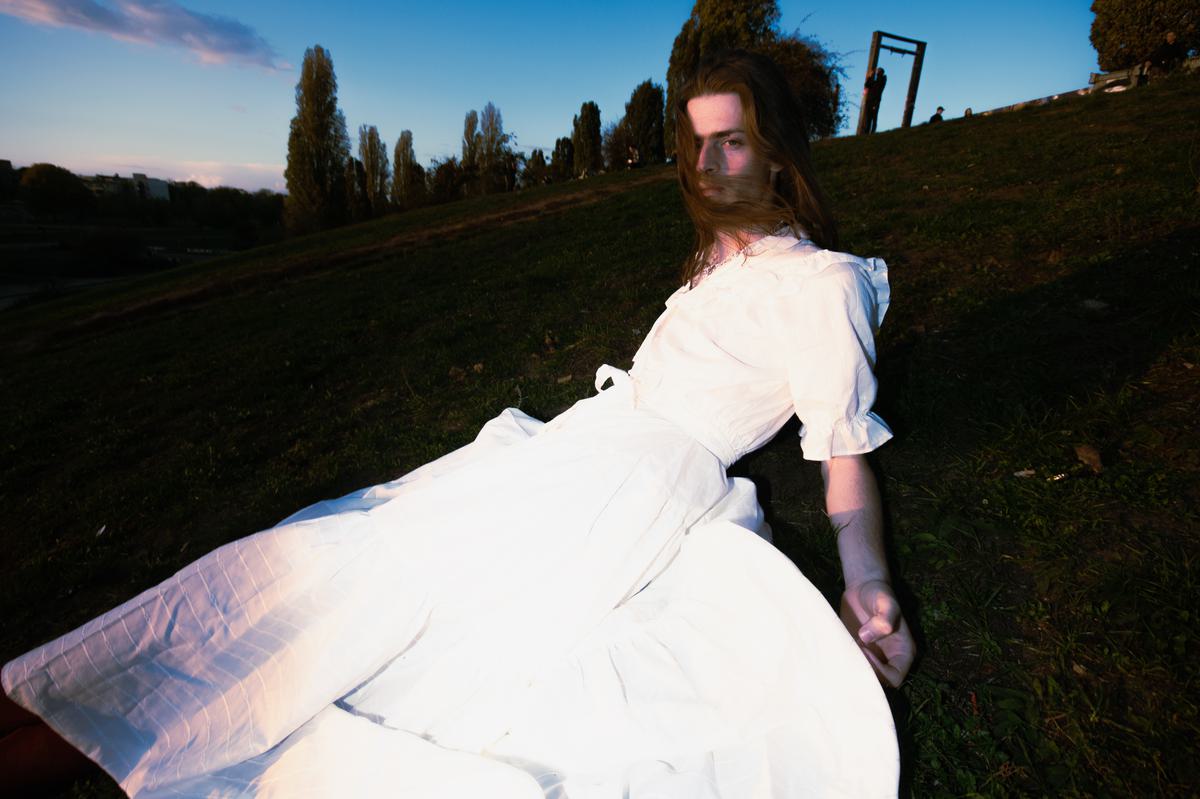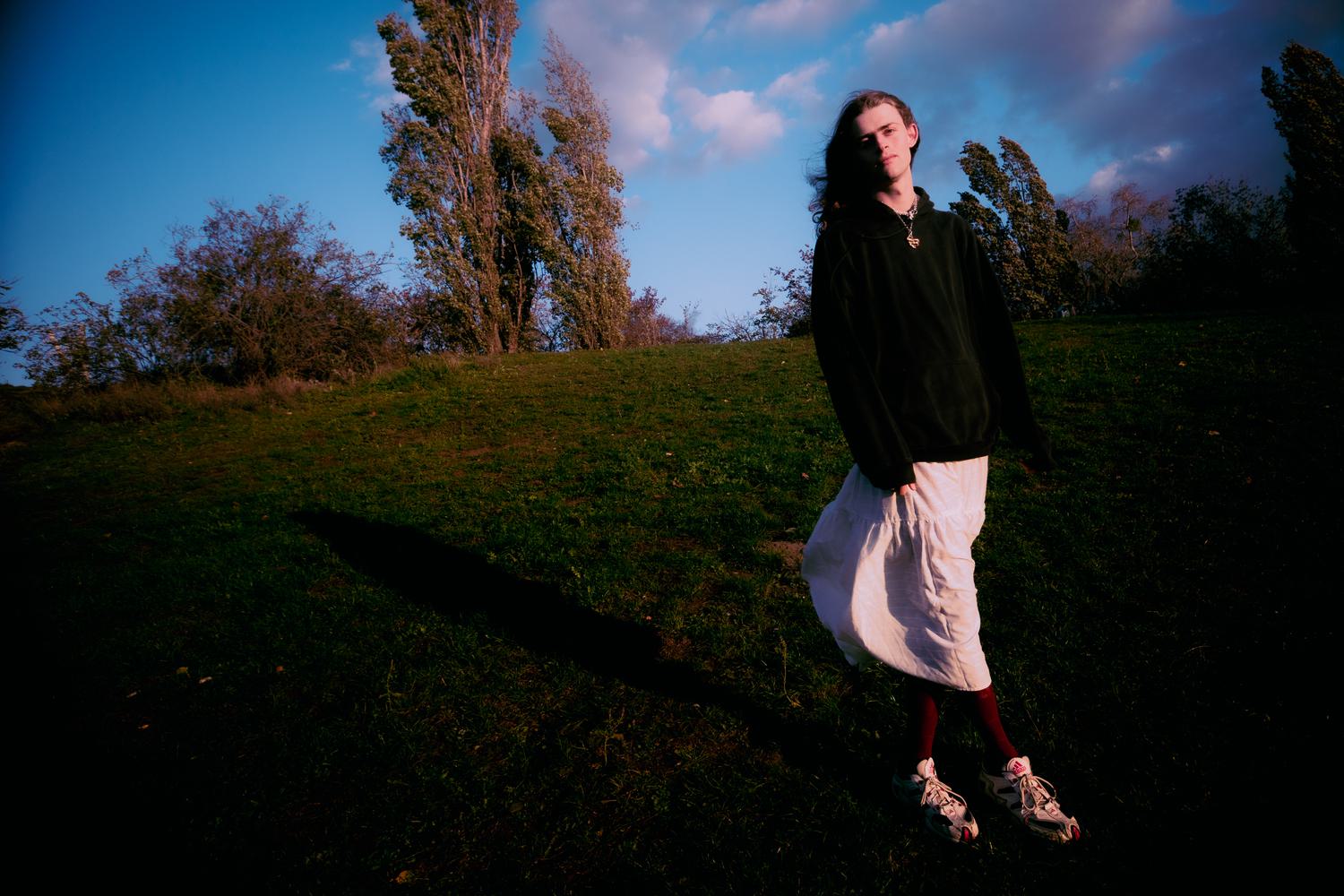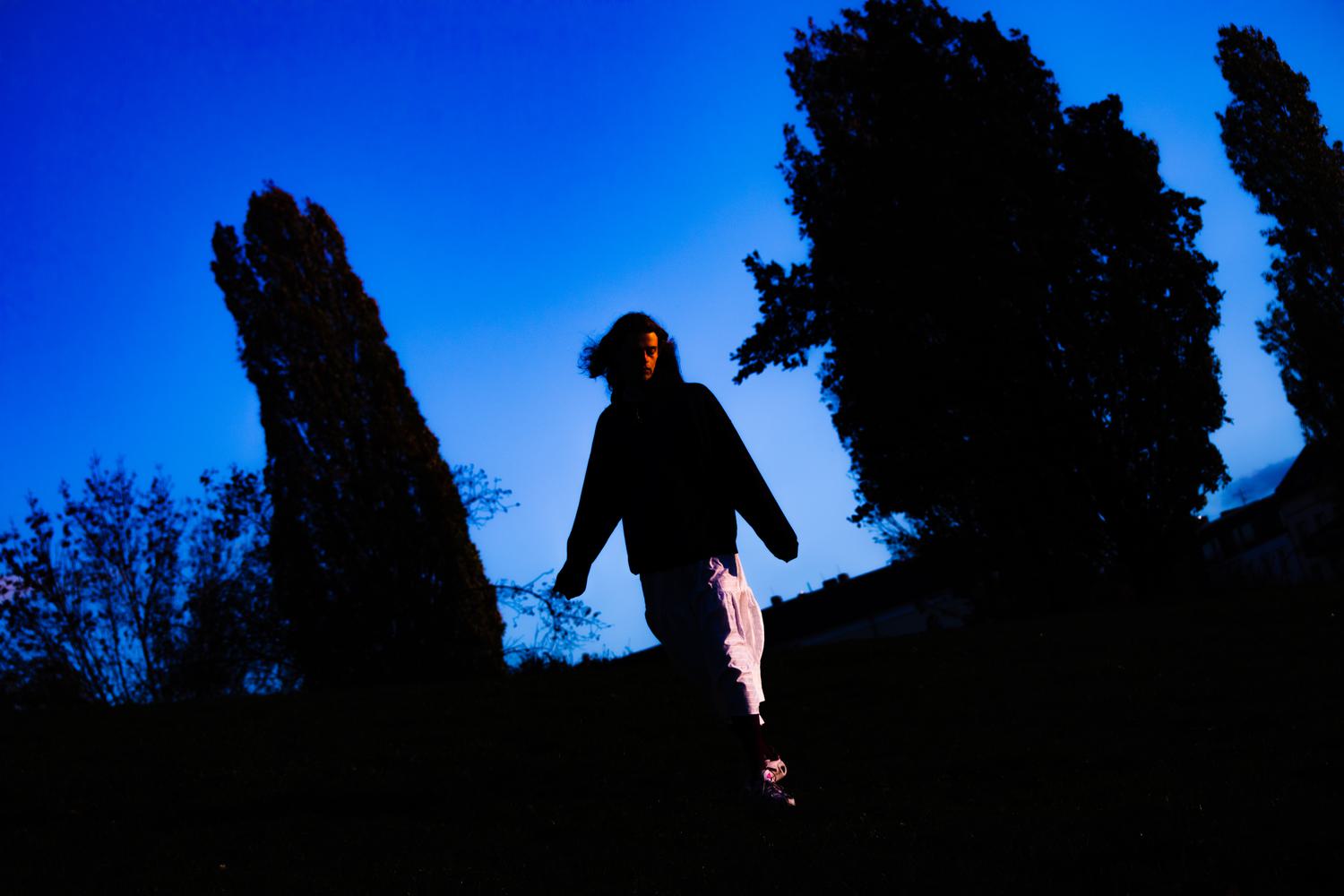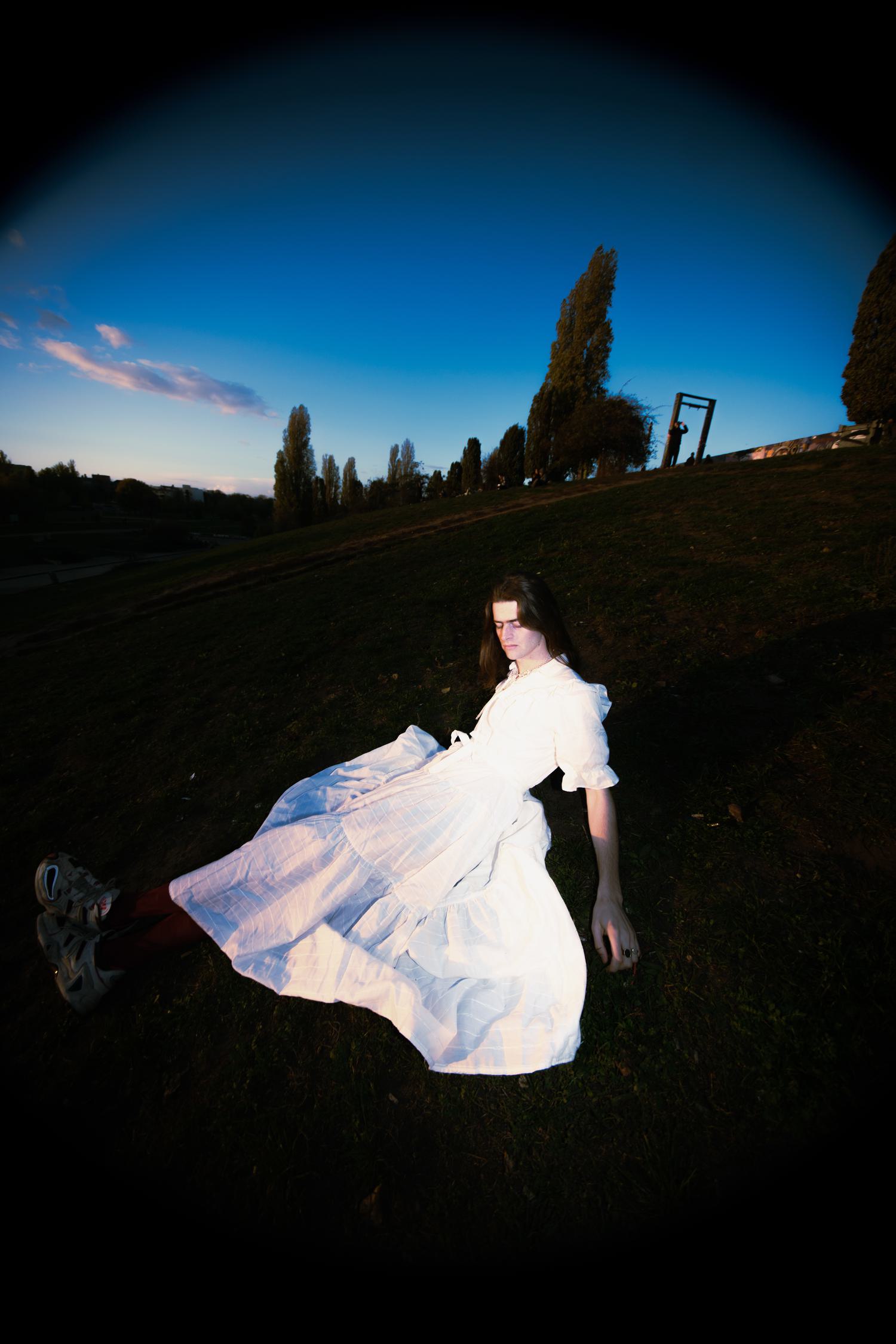
In conversation with Ben Gregory
On episode, Ben Gregory steps out from former band Blaenavon and comes to face emotional upheaval purely on his own terms. He speaks to Amy Albinson about his new solo album, the turbulence of mental health, and the thing he loves most in this world – creating music.
It’s been a few months since songwriter Ben Gregory officially announced the dissolution of Hampshire-formed indie trio Blaenavon but, as he’ll admit, the band were finished long before.
The disbandment of Blaenavon was a slow and steady process, but one intrinsically intertwined with Gregory’s own mental health. It's a subject he's been open about with fans since being hospitalised in late-2017, a year on from the release of their critically-acclaimed debut, That’s Your Lot. It’s also a battle that has punctuated the group’s career.
Forced to cancel their US tour with indie-rock trio The Wombats in favour of rest and recovery, the ongoing struggle played a large role in the central themes of their follow-up, Everything That Makes You Happy. In mid-2019, as the group pulled out of their sets at London’s Community Festival and Reading & Leeds citing “ongoing health issues”, Blaenavon fell mostly dormant as the pandemic took hold.
It’s this internal fight that shapes Gregory’s solo debut, with the aptly-titled episode a periodic reflection on mental health. Laced with an overarching determination for recovery, hope burns at the edges of the 8-track offering. Working with Blaine Harrison of Mystery Jets and engineer Matt Twaits to bring ideas to fruition, Gregory now finds himself free from the hindrance of an established genre mould, or any bandmate compromise.
Lyrically sincere, the album amplifies heartfelt feeling to frenetic heights, piecing together a cathartic rush of creative focus in the wake of psychiatric treatment. Now based in Berlin on a year abroad at Humboldt University, he's on the path to a fresh start, splitting his time between an English and German degree, and his upcoming solo effort.
I meet Ben on a dreary London evening, the chill of winter still clinging tightly to the first month of spring. Settling into the couch in a small attic space studio above Transgressive Records’ office, the open window looks out at the rain cascading down to the dark street below. He’s spent the day in here, he tells me, writing music and making his way through stacks of CDs needing signed. The remaining small pile now neatly line the studio’s off-white shag carpet.

BEST FIT: It’s lovely to meet you, Ben. How’s your day been?
BEN GREGORY: It's been really nice. Well, I slept pretty badly. I woke up at five and then was like, I think I've just got to ride this through because you know, it's light out and can't really get back to sleep, so I powered through. Read a book for a bit, came to the office, picked up my new ultrasonic nebuliser to keep my vocal folds moist because I've been having some vocal problems, and then made some music at the Transgressive studios. And now we're here, so overall it's a pretty cool day.
That's good to hear! So I'm here to talk about your new record and the journey you’ve been on since the dissolution of your previous band. I’m a longtime listener but it’s quite a hard name to pronounce, so I was hoping we could start there. How do you say it?
That was pronounced Bly-Nah-Vun, but luckily I thought I was never gonna have to say that again. It's Blaenavon, it's a Welsh town. Someone messaged me quite recently on Instagram to be like 'yeah, you guys made good music but you really cost us in the tourism industry by calling a band that, so be more careful next time you name your band after a town'.
I thought it was a little bit uncalled for because I didn't mean to, but it kind of broke my heart a little bit. I hope that's not my legacy in that town, like ruining their tourism industry. That'd be terrible. But yeah, Blaenavon, and now everyone can just focus on the town. The town's bigger than the band once again.
Ha! You actually were on my Spotify Wrapped for two years in a row, and I still messed up the band name every time I said it.
Oh yeah, which song? Or just the artist?
Both! I'm trying to think of which song it was. I think maybe “Prague '99” and another one.
It's funny, no matter how old I get and how many songs I write, people always mention the song “Prague”. I'm like, 'Oh God, I peaked at 15... well, maximum 16.' I've been writing songs for 10 years since then and everyone still loves “Prague”. I guess it has that really sweet, youthful honesty about it.
Starting at the beginning for this current project, Blaenavon had two widely acclaimed albums and, from an outsider's perspective, it all seemed to be going quite well. When you decided to finally call it a day, was it a hard decision for you?
It was never even a decision. It very much just was clear to everyone that our roles had become untenable. We'd tried our best to get through some very difficult times, and we just needed to all look after our health for a while; which included not being in that band for a bit or maybe forever. Well, probably forever. But no, it wasn't ever a decision like 'shall we stop?' It was just like, we tried. We tried, and made the second album and we kept pushing it, and I've already pushed myself a bit too hard, and, you know, suffered from that.
The band started when you were 14, right?
Yeah 13 or 14, super young. That was just me and Harris the drummer at the time. We would just cover songs from like Guitar Hero 3 in his grandmother's bedroom.
Guitar Hero is a classic, any particular song?
Probably Misery Business.
Nice, everyone always goes for Misery Business!
Yeah, I think it's because on people's first albums, you're really, really, really writing music without worrying about any of the consequences. So it's just totally honest and totally uncontrived and means that super natural and super sweet stuff, like super earnest stuff, comes out.
It's often said that your debut album is your life up until that point, right? You've had all your life to make it, then you're expected to make the follow-ups in a much shorter span of time.
That is a difficult thing. Yeah, I guess we were writing for five, six years.
When you called it quits, you described the music business as "a sickening stain on the underbelly of the arts" in your announcement. Was the industry quite restrictive? Was that kind of the point you were getting at?
Oh, I think it was just meant to be a little wry joke. Because really, my experience in the music industry has been pretty amazing in the grand scheme of things in terms of the people I've been able to work with and I've had in my life for so long. Transgressive [Records], that's not a hard deal. Some people have a shite time with shite people, but I guess that was just a little bit of a funny joke because I'm complaining about something that I'm about to dive back into. Because yeah I need it, it's what I'm here for I think. So “sickening stain on the underbelly of the arts,” funny joke isn't it?

From what I’ve read, it seems like your health and creativity were quite at odds with each other when it came to Blaenavon’s music. Was there a turning point where you realised music wasn't a healthy outlet for the moment?
No, it was never the case that music was an unhealthy outlet. It was the case that everything around the music was unhealthy. Performing it when I didn't feel like I had it in me on certain occasions. The total sense of placelessness of travelling around when you just want to feel at home somewhere. Those things are hard. Then, when your outlet becomes intertwined with the need to sell things, it's very hard as well.
What I mean I guess about writing the first album and writing the second album, you have to just force the idea out of your head completely. Making music and the more you do it, the more you think, 'oh, someone's going to hear it this way and someone's going to enjoy this in that way', those types of thoughts are very intrusive and very damaging to the process I find. So all those things, trying to get rid of it, which is why I needed a quite good, clean break.
Writing this album was the first time in a long time I've felt like I was just having the time of my life, making cool stuff that was under no pressure because the world was shut down and I didn't know if I was going to put out a record again, or what was going to happen. It was totally just dedication to my emotional outlet.
Yeah, that sounds so freeing. Do you think you've changed in the last few years since dissolving the band now you have a new project that's entirely yours, and you're fully in control of it?
I can't separate the dissolution of the band from like, the dissolution of my brain whilst being like, really mentally unwell. So, whenever it's questions of like, breaking up the band, it was just that that was a necessity because I needed to really really stop doing everything and just sit still and recover and try and work out how to be a functional person again because I was really not very well.
I was sort of on the way up and then we moved into the pandemic and then that slowed things down in some ways, but also meant that I went back and lived with my mother and had stability. Although it was like, not a lot going on, at least it was kind of consistent that I could stay there and was lucky enough to be able to do that and make music and recover there. Then moving to Manchester was quite a big deal, like a proper fresh start that I really, really needed.
What was that move like for you?
It was a proper fresh start. I had and have some really lovely friends there, but aside from that, it was becoming part of a real new community in terms of geographically where I was and being at university and working out how to navigate that.
It was nice in the way that I could leave London. I felt like a new and strange person after going through what I went through, and was quite pleased to feel like I could truly give new first impressions to people and work out who I wanted to be – and that was no longer within the parameters of being “young music guy in a band in London” that I was quite tired and sad of.
I sort of established a solid footing in that way with my close friends up there. [I could] work out how, when and if I wanted to go back into music. There was a while where I sort of pretended to myself that I thought that I wasn't going to do it anymore, and then that just proved itself to be total nonsense. Because it's what I really, really, really love.
I feel really positive about how I've grown since [Blaenavon]. But then in other ways, I just find the most basic parts of life like completely impossible. I don't really know where it's coming from and it's kind of getting worse in lots of ways. Just feeling like completely overwhelmed so often, to the extent that walking down the street is quite difficult and quite scary. Part of that would have been from illness, and part of that is from being so isolated for so long. I don't know how long it's going to take until I feel comfortable meeting people and like, shaking hands and being at gigs and stuff. I don't know, it's always absolutely everything or absolutely nothing and I come back to London here for a bit and I'm so excited because there's so many people that I love so much that I haven't seen for so long. But, at the same time, it's so many reminders of such difficult times here, especially around this part of London. It kind of reminds me of why I felt like I needed to leave.
Do you feel like you associate places with feelings? Like you see a place where something happened, and it throws you right back?
Yeah, I have that. I don't have that in any other city or part of the world really, but I have it so massively in East London.
When was it you moved away?
I lived in London for a long time, different parts of it, and then was living with my mother back home during the pandemic, and then moved to Manchester to start my degree. I'm doing an exchange at Humboldt University, so I'm now in Berlin.
That’s quite a change. Have you picked up much German?
My German is – if I'm content and comfortable with someone I know, I'd say it's very good. But when I'm in a busy place and someone says anything, some stranger says any sentence to me, I freeze and freak out and can't respond in the most simple way. So, I kind of picked the most foolish degree I could because it's something that no matter how much you try and study it and get really good, basic self-confidence issues mean that it's completely useless in situations when you require it.
Coming back to your solo project again, you've chosen to release music under your own name, foregoing a moniker and putting yourself in the spotlight. Why did that feel right?
I think there's so many reasons. It's so personal that I didn't want to cover up anything or hide behind anything. I spent so much time of my life explaining to people what this bizarre looking word means that my band was called, and I just didn't want to have any reason for anyone to not understand what it meant or not be able to Google it.
When you're really young and you want to be around something, you just do it and you're not worried about it and it's fine. No matter who tells you to change it you just do it. It doesn't matter. You have the sort of gusto and the guts to carry it off. But then, the idea now of picking something or like writing something or finding something would have felt so forced and so contrived, and just felt ridiculous. Like standing on stage and being like, “hey, I'm saying anything that wasn't my name” would feel completely wrong, completely fraudulent.
I read that you collaborated with a couple of friends when working on this debut album. What was that like?
I mean Blaine was wonderful, in countless ways. The thing that I really hold on to is just how inspiring a personality he was and is to have around: his gentleness and his kindness and positivity. He's a great producer in terms of like, instrumentally what he brings and ideas and everything like that, and the song 'smoke' obviously would be nothing without him. But it's as much a part of the role as how you make someone feel, and it constantly made me feel really excited to go to work.
I owe him a lot because I find things like recording and having the countdown in my calendar of how little time we have left utterly terrifying. If I hadn't had someone like Blaine, and also like Matt, making me feel like it was going to be okay, it might not have been okay because I might have just spent the whole time sitting still shaking instead of pretending to be able to program drums.
I saw a quote from you that said you consider “blue sea blue” to be your best work. Could you tell me a bit more about that song?
Yeah, I think that's the best thing I've done. It's a 10-minute song, and I think it includes every part of what I think is cool or unique about me, musically and artistically, all tied together. It tells a story that's difficult and painful to tell in I think a fairly artful and succinct way. It ends pointing towards a potential positive future. I just had a really nice time making it and writing it and it just came really, really naturally. Nothing of it was forced or difficult. Some of it was sad, but none of it was ever a strain. I don't know where it came from. It's sad, like when you have done something that you're so proud of like that, you're sort of trying to usher back that type of creative inspiration which is very rare. So now I sort of spend a lot of my time trying to get back to that point where I felt so positive about writing music that I did that. Yeah, I think it's great.
It's a really gorgeous song, and so different from your previous work in the band.
The most inspiring song, if there's like one reference point for that song, it would be the song “Siberian Breaks” on the second MGMT album. I keep finding myself talking about MGMT because they are the most underrated band of all time and that album, Congratulations, is so sick, and so progressive, and so forward thinking. That song “Siberian Breaks”, I heard that when I was 14 and I got the 12 inch from Record Store Day that's engraved with some cool blue shit.
What stands out about them for you?
I say this like several times a year, but they're the most underrated band of all time. If you grew up at certain time, you were lucky enough to have all their weird but super melodic electro-pop music that sort of grabbed you, and then you were lucky enough to be raised by the stuff that they went on to make that was just like really out there and really, really awesome and really original. I really love that band, I want to get them to listen to "blue sea blue".
With your new album, you've moved on from the indie space into a more electronic sound, with heavier synths and some quite chaotic melodies. Where did this new direction come from?
I think because, well, being in the band wasn't restrictive but the best way we'd work together would be in a room playing our instruments. So obviously you end up making a lot of songs with certain instruments, and that was great and worked really well for a long time, but it did mean that there were often lots of things that I'd made at home and demos and songs that I'd made that we just never really worked out how to work on properly because we didn't really know how to play them.
Not having to worry about that anymore was really nice and it just meant that anything that I was listening to or that I was inspired by at the time sort of made its way as a reference into what I was doing. I could just record it and do it, and then we made the finished record from the stuff I started with, the skeletons of things I'd made at home. So yeah, I was free to incorporate everything that constitutes my taste which meant that I think it's fairly diverse.

Are there any topics that you find the hardest to write about?
There's certainly subjects that I find easiest to write about, which is hospitals and stuff. Just because it's so ingrained in me. It's such a strange and difficult and bizarre place, but where also the most amazing and hilarious things happen and the most lovely friendships, even if they can be quite temporary.
Weirdly or not, I don't find it very upsetting. Going back to those places and writing about that, I always find it very cathartic and inspiring. But again, it's never “oh, I'm going to go in and deliberately write about this thing”, it's just what sort of bubbles up to the surface and takes shape. I find writing lyrics hard if I'm thinking I'm gonna write about this specific thing, that's when I find it really difficult. When I just let myself scribble or type…
Like freewriting?
I feel like the best things I've written recently has just been... I've got in a really good habit of going for really long walks around Manchester without any kind of distraction, and just like taking in the new very exciting place. I'd come up with certain things that I thought were funny or pretty, and then I keep working lyrics out in my head until I felt like an actual song was sort of forming, and then I wouldn't have a phone or like, a pen or paper to record anything. Then I'd have to run home in a hurry like, “oh shit, I don't want to forget this because I think it's kind of good.”
What's next for you after episode is out in the world?
So episode is out on the 7th of April, and I'm on my semester break from Humboldt. It just meant that we had to cram an entire campaign into this one month where I could be in London, so I made the video and then flew back here. Full diary of cool and exciting things. So while I'm here, I'm making some new music with someone who is really, really cool which I think will also come out this year, and then I'm making some more new music with a little band of people who are really, really cool.
I'll plan those shows at the start of April in record stores, and maybe play some more shows at the end of the year. But the main thing is, the thing I love doing, is writing and recording music and Transgressive are the best people ever so they're just finding all the best ways to help me do that. So just more music will come up pretty soon and it's pretty great.
Get the Best Fit take on the week in music direct to your inbox every Friday

Lorde
Virgin

OSKA
Refined Believer

Tropical F*ck Storm
Fairyland Codex





